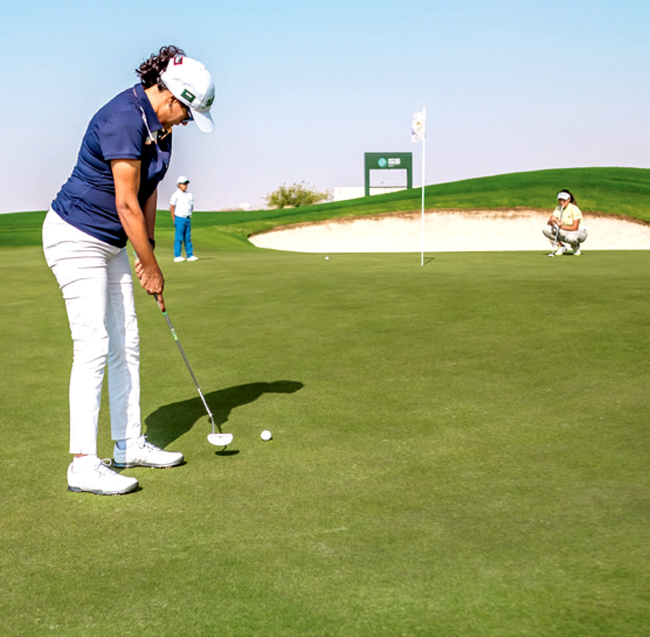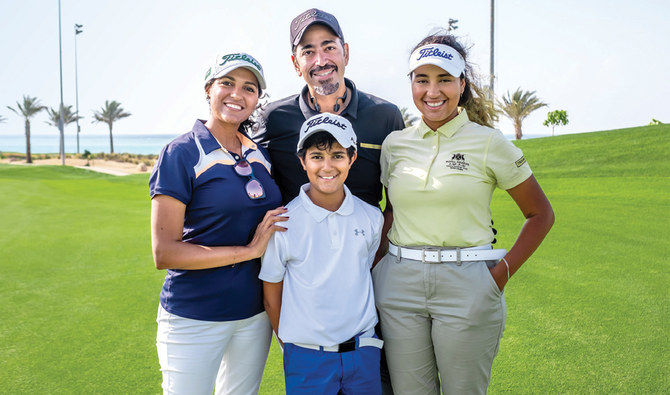JEDDAH: A golfing Saudi mother and her two children are to grace the opening day of a major tournament taking place in the Kingdom as their country's ambassadors of the sport.
Schoolteacher Raghdah Al-Essawi, who only took up the game a year ago, has been picked along with her kids Layla, 16, and Omar, 11, to represent their country at the Saudi International, which starts on Thursday at the Royal Greens Golf and Country Club in King Abdullah Economic City (KAEC).
And teenager Layla has revealed her dream of becoming the Kingdom’s first-ever female professional in the sport.
The talented Al-Telmissani family trio was part of the Saudi Golf Federation national team that competed at the Pan Arab Golf Championship in Egypt last year. The event saw the mother and daughter become the first Saudi women to play for the Kingdom in an international golf tournament.
Al-Essawi, from KAEC, who started playing golf at Royal Greens just over 12 months ago, said: “At this moment in time there’s not many people, especially ladies, who play golf or even try playing golf in Saudi.
“But it is such an easy sport to get hooked on. It’s a great family activity and it really does have no age barrier – anyone can start playing.”

As part of the Vision 2030 reform plan, Golf Saudi hopes over the next 10 years to encourage 1 million Saudis to try golf for the first time. The aim is to grow the game to such a level that by 2030, 50 percent of the population will have access to golf facilities within an hour’s drive of their home.
Golf is considered a strong platform for the Kingdom to promote its sporting vision, ambition and many social and economic opportunities — all of which will be showcased this weekend when the world’s top golfers vie for prize money of $3.5 million in the second Saudi International, powered by SoftBank Investment Advisers.
Al-Essawi’s husband Mohammed Al-Telmissani, said his family got great enjoyment from playing golf.
“What I love about golf is the time it gives me to spend with my family. When we are out on the golf course our mobile phones are put away, and it’s just great time together. We talk and have fun. That quality, family time is the major attraction to me. On top of that, it’s played in a beautiful location and is an enjoyable challenge.
FASTFACTS
• The mother-and-daughter team of Raghdah Al-Essawi and Layla was part of the Saudi Golf Federation national team that competed at the Pan Arab Golf Championship in Egypt last year.
• Golf Saudi and the Saudi Golf Federation are supporting mass family participation in the sport.
“Golf really is absolutely new here (in the Kingdom). Even when I try and describe it to friends or say I’m going out to play golf, they confuse it with other sports — mimicking the action of grass bowls, for example. That shows the low level of understanding and awareness there is for the game here,” he added.
However, Al-Telmissani said he had seen a change over the last year, with people starting to travel and commute to KAEC to play the game. “A golf community exists here, and there’s a lot of motivation in that.
“There are some really great players here in Saudi Arabia now. I’m very excited to see where golf could take Layla, Omar and my wife in the coming years,” he added.
Last week his daughter Layla was inches away from a hole-in-one on Royal Greens’ most famous hole, the par-3 16th, where tournament champion Dustin Johnson landed his ball in the water in his final round last year.
What I love about golf is the time it gives me to spend with my family. When we are out on the golf course our mobile phones are put away, and it’s just great time together.
Mohammed Al-Telmissani
Layla, who also does gymnastics and plays basketball, badminton, and volleyball, said: “My dream is to become the first Saudi woman professional. Golf is very stress relieving. Being out on the course takes you to this whole different environment, and I like that.”
For her brother Omar, the game of golf is all about trying to hit the ball as far as possible. “Golf is really fun to play. It’s exciting hitting a good shot,” he said.
Golf Saudi and the Saudi Golf Federation are supporting mass family participation in the sport.
“It has been a real pleasure for us seeing how Mohammed, Raghdah, Layla and Omar have all taken to the game of golf. They are a joy to have around the clubhouse at Royal Greens and are really developing as players,” said Prince Khalid bin Saud Al-Faisal, adviser to the Saudi Golf Federation and Golf Saudi Chairman Yasir Al-Rumayyan.
“At Golf Saudi we are committed to the five pillars we consider central to growing golf in Saudi Arabia: Developing access and infrastructure, nurturing talent through golf academies, promoting mass participation, hosting world-class events, and bringing international players of all abilities here as a means of golf tourism,” the prince added.






























